One of the most common cases that will worry any pet owner is that your bearded dragons seem to have some lethargic bearded dragon symptoms such as being lazy or lethargic, not eating, sunken eyes, and so on.
And I’m sure that many of you will wonder this will be normal behavior or a sign of serious health issues that many beardies may suffer from.
To have a more profound understanding of the reasons why your bearded dragon is lethargic and lazy, as well as the differences between lazy and lethargic, don’t hesitate to have a look at this article.
Related Posts:
- Treating MBD in Bearded Dragons
- Do Beardies Eat Pears?
- Why Is My Beardie Hissing at Me?
- Can Beardies Sleep With Lights On?
- How Big Can Beardies Get?
- Reasons Why Your Bearded Dragons Turned White and Died
- Why Is My Bearded Dragon Breathing Heavy?
- Why Is My Bearded Dragon’s Mouth Open? Reasons and Tips
Is Your Bearded Dragon Lethargic or Lazy?
The discrepancy between a lazy beardie and a lethargic one can be seen clearly.
Regarding lazy dragons, they simply lay around for one or two days without doing anything but then they would be active and happy again.
This is explained that like human beings, beardie also needs a day-off for resting or relaxing.
Therefore, you shouldn’t be way too worried, and keep an eye on their behaviors for the next few days.
On the other hand, a lethargic beardie will show much more serious health issues as you can easily realize some lethargic bearded dragon symptoms such as not moving much at all, staying in one location for days and days, or acting very sluggish and unresponsive.
Therefore, you had better get help from a qualified veterinarian to know why beardie is lethargic and have effective solutions.
Why Is Your Bearded Dragon Lazy NOT Lethargic?
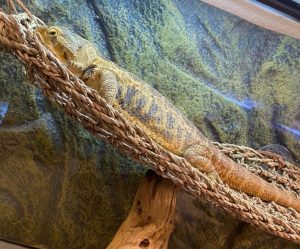
1. Lack of UVA Radiation
UVA radiation plays an important role in promoting good health for beardies as beardie’s appetite will be stimulated. This leads to good health as well as higher levels of activity.
Therefore, when you notice that the beardie is a bit sluggish or lazy, the first thing you should do is to check your lighting.
That is also the reason why pet owners love having full-spectrum lighting in the dragon’s terrarium as it includes UVA radiation.
Here we would like to give you some recommendations about full-spectrum lighting lamps that you can easily buy one such as a fluorescent tube, compact fluorescent, and you should have the lamp turned on for at least 12 hours per day.
When using the Mercury Vapor bulb, you should place it within 12 inches of beardies.
Regarding the fluorescent bulbs, as time goes by, they will lose their effectiveness so you had better replace them every six months.
2. Lack of Proper Heat
Besides checking the UVA radiation, you should also check the temperatures as well when your beardie seems to be lazy or languid.
In case of low temperatures, your beardie will be more likely to lose their appetite and activity levels.
To monitor the terrarium temperatures exactly, we suggest you try using high-quality thermometers and placing them at each end of the terrarium (one in the basking area and one in the cooler area).
3. Brumation During Winter Months
Brumation is some kind of hibernation that occurs in adult beardies and takes place commonly during the late fall through the winter months.
In the period time of brumation, beardies are more likely to sleep for days or even weeks, which drastically reduces their appetite.
Therefore, you shouldn’t worry too much about this normal activity.
4. Bad Diet
One of the most common mistakes that pet owners often make is giving beardies a bad diet.
For example, most of the beardies keepers may overfeed their beardies or even feed the wrong food.
5. They Are Hardy
Maybe you will be surprised at the fact that your beardie can be normal and strong without food for 1 or 2 weeks just because he is so healthy, hardy, and sound.
Therefore, you shouldn’t provide your beardie any food at least one day per week to reduce the chance of overfeeding.
Why Is Your Bearded Dragon Lethargic?
To answer this question, you should check temperature, food, health, habitat, …
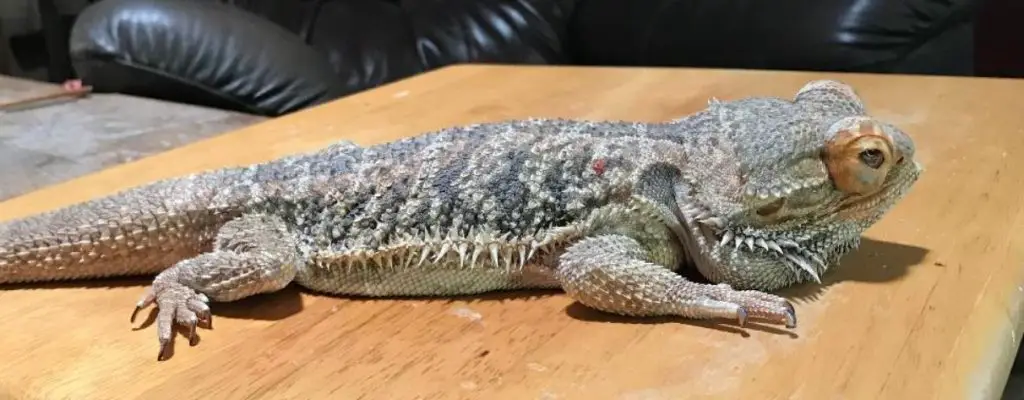
1. Low Temperature
Temperature plays a crucial role in promoting a beardie’s health, and it is common for the temperature to be between 95 °F and 110 °F.
If the temperature is higher or lower than this level, it will hurt your beardie as he isn’t more likely to move, eat, or drink much.
Therefore, you had better check your lighting daily, especially in case your beardie is so lethargic.
2. Bad Husbandry
Animal husbandry is not an easy job at all, and you will face many difficulties when raising your beloved beardies as husbandry includes everything from lighting, terrarium, the size of the tank to food, diet, and so on.
Therefore, when your beardie is lethargic, the reason may come from your bad husbandry.
And you have to check a lot of things.
3. Overfeeding and Feeding the Wrong Food
One reason why bearded dragon is lethargic can come from the fact that they are sick or obese due to overfeeding or the wrong diet.
And, this makes beardies more vulnerable to diseases.
For example, you feed your beardie too much live food with high protein such as mealworms and super worms while there are few greens in his diet, which will make him fat and sick.
Therefore, you should make sure that you will provide your beloved dragon a healthy and balanced diet.
The question that can puzzle any beginners maybe “How often do beardies eat”, and we would like to give you some information about the reptile’s diet depending on its age so that you can find the answer easily.
In general, the frequency of feeding beardies, and the components of the diet vary following their ages.
On the one hand, young beardies and semi-adult beardies have the same diet, including 60 percent protein and 40 percent salad.
However, while the former need to be fed three times a day, the latter should be fed once a day.
On the other hand, it is recommended to have more greens in the diet of adult beardies than animal feed.
The figures are 70 percent and 30 percent respectively. Also, you just need to feed them 1 time every 2 days.
| Age | Protein (%) | Salad(%) |
|---|---|---|
| Baby beardie (up to 5 months) 3 times a day + supplements | 60 | 40 |
| Semi Adult beardie (5-18 months) 1 time a day + supplements | 60 | 40 |
| Adult beardie (18 months and over) 1 time per 2 days | 30 | 70 |
The reptile’s diet depending on its age.
4. Your Bearded Dragons Are Sick (a clear sign of lethargy)
Besides the three reasons mentioned before, bearded dragons acting lethargic can suffer from metabolic bone disease and impaction.
Regarding metabolic bone disease, this is a common disease that is the consequence of a vitamin D3 deficiency.
In this case, you have to immediately check your UVB lights as well as take your beardie to a reptile vet as soon as possible.
In terms of impaction, it happens when your beardie might eat some substrate or feeder insects that are too big.
The common symptom of impaction is that your beardie may stop moving as impaction can lead to paralysis in his hind legs.
In this case, you had better take your beardie to a veterinarian immediately to reduce the suffering as there is little chance to treat impaction.
And it is more likely to cause death in a beardie.
5. Possible Parasites
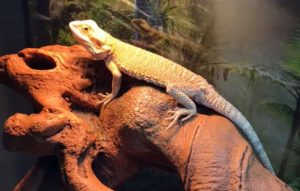
Possible parasites are seen as a reason why a bearded dragon is lethargic.
Some symptoms are helping you to know whether your beardie has parasites or not.
In specific, a very common indication of possible parasites is runny and smelly poop without solid white urates (the part at the end of the stool).
Meanwhile, a healthy beardie will have a stool that is fairly solid, dark, brown, or green, accompanied by a solid white urate.
The reasons for the infection of parasites are contaminated food sources and dirty living conditions.
Parasites are dangerous as they could lead to serious health issues in beardie. In this case, you had better take beardies to a veterinarian for analysis.
6. Dehydration
Dehydration will be also the reason why your beardie is lethargic.
Some symptoms that you can realize are sunken eyes, reduced appetite, weight losing, or solid stool.
Another way to check is by pulling on your beardie’s skin. And if it doesn’t get back into the normal position, it means your beardie is suffering from dehydration.
Therefore, it is very important to mist your beardie or bath him with fresh, dechlorinated water as well as offer him fresh water to drink every day.
There is one recommendation that I would like to introduce to you to encourage your beardie to drink from the water bowl by using The Big Dripper.
All you need to do is having the big dripper filled with fresh, dechlorinated water, treated with ReptiSafe.
And you should place it on top of the screen cover of the terrarium over the water bowl.
Finally, make sure you set it to release a slow drip of water into the water bowl.
In this way, a rippling effect caused by dripping action will draw beardie’s attraction to detect the water.
Read More:
- Can Beardies Eat Chard?
- Can Beardies Eat Honeydew Melon?
- Do Beardies Eat Radish Greens?
- Can Beardies Eat Dill?
7. Too Much Stress
Being too much stress can cause beardies to be lethargic.
The reason for this may be that your beardie has just brought to a new home with drastic changes or a way too careless handling.
Therefore, you had better give him time to adapt to a new environment as well as create a lot of hides in the tank.
And this will be an effective way to prevent your beardie from being stressed as well as potential sources of stress.
8. Brumation
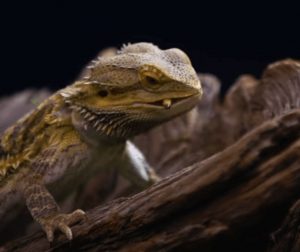
Brumation is completely normal. And a pet owner, you should know about this and don’t need to worry.
The common time for beardies to take the brumation is during the late fall, at the beginning of November.
Before getting into brumation, your beardie will show some signs such as not eating and drinking, being very inactive and lethargic.
However, if your beardie still has these symptoms after the brumation, don’t hesitate to have him checked by the veterinarian as there may be some factors such as humidity or temperature that has negative impacts on your beardie during the period of brumation.
9. Hypoglycemia (popular reason why bearded dragons are lethargic)
You may find it quite rare but this doesn’t mean that it is impossible.
I realized that hypoglycemia was the reason why my beardie was lethargic and sick, and this happens after the brumation.
The solution to avoid hypoglycemia is proving your beardie with some fruits, and sugar which will immediately change your beardie´s behavior.
Related Posts:
- Can Beardies Eat Rosemary?
- Can Beardies Eat Brussel Sprouts?
- Do Beardies Eat Peas?
- Can Beardies Eat Squash?
- Can Beardies Eat Pears?
10. Want to Be Alone
Keeping your beardies in groups can result in some serious issues as beardies are solitary animals.
In specific, a male beardie will be more likely to be aggressive if he confronts another male beardy that getting in his territory.
Meanwhile, male and female or two female beardies can get on well with each other but no one can sure about it.
Conclusion
I think that it is so normal for you to ask yourself some kinds of questions such as “why is my beardie lethargic or lazy”, “ why is my baby bearded dragon lethargic and not eating”, and so on.
And, I hope that you, guys, can answer this question after having a look at our article.
If your bearded dragon is lethargic or lazy, you had better check your beardie, his diet as well as his housing conditions. You should immediately take him to a veterinarian for checks and treatments in an emergency.
Key points to remember as to why your bearded dragon my be feeling lethargic:
Lethargy, or a noticeable lack of energy and activity, can be a concerning sign in bearded dragons. While occasional periods of rest are normal, persistent lethargy may indicate an underlying issue. Here are some common reasons why your bearded dragon might be lethargic and potential solutions:
1. Temperature Imbalance:
- Bearded dragons are ectothermic, relying on external heat sources to regulate their body temperature.
- If the enclosure is too cold or too hot, they may become lethargic. Ensure the temperature gradient is appropriate.
2. Hunger and Thirst:
- Lack of appetite or dehydration can lead to lethargy.
- Check if your bearded dragon is eating and drinking adequately, and provide fresh water and a balanced diet.
3. Brumation:
- Bearded dragons, particularly adults, can enter a state similar to hibernation called brumation.
- During this period, they become less active and may spend extended time resting. It’s a natural behavior.
4. Inadequate Lighting:
- Bearded dragons require proper UVB lighting for calcium absorption and overall health.
- Insufficient lighting can lead to lethargy and metabolic issues. Ensure the lighting is adequate.
5. Stress or Changes:
- Bearded dragons can become stressed by changes in their environment or routine.
- Re-evaluate recent changes and provide a calm and stable habitat.
6. Digestive Problems:
- Constipation or impaction, often caused by improper substrate ingestion or inadequate hydration, can result in lethargy.
- Ensure your dragon’s habitat has a safe substrate and maintain proper hydration.
7. Illness or Infection:
- Lethargy can be a symptom of underlying health issues, such as respiratory infections or parasitic infestations.
- Consult with a reptile veterinarian for a proper diagnosis and treatment.
8. Overgrown Nails or Teeth:
- Overgrown nails or teeth can cause discomfort and lead to lethargy.
- Regularly trim your dragon’s nails and monitor their dental health.
9. Inadequate Enclosure Size:
- A cramped or undersized enclosure can lead to stress and reduced activity.
- Ensure your bearded dragon has enough space to move, explore, and bask.
10. Aging: – Older bearded dragons may naturally become less active and more lethargic. – Ensure their comfort and provide a suitable environment for their changing needs.
11. Inactivity During Molting: – Bearded dragons often become less active during the molting process. – Be patient and allow them to shed their skin comfortably.
12. Respiratory Issues: – Lethargy can be associated with respiratory problems or breathing difficulties. – Consult a veterinarian if you notice signs of labored breathing.
13. Social Stress: – In some cases, interactions with other bearded dragons or cohabitation can lead to stress. – Ensure a harmonious social environment, or consider separate enclosures if necessary.
In summary, when a bearded dragon is lethargic, it’s essential to consider various factors that may be contributing to their reduced activity. Evaluate the temperature, lighting, diet, and overall health of your dragon to identify the cause. If lethargy persists or is accompanied by other concerning symptoms, consult with a reptile veterinarian for a thorough assessment and appropriate care.
Further Reading:
- Carolina Custom Cages Terrarium Review
- 8 Best Basking Rocks for Beardie: What Is the Best Choice?
- 10 Best Thermometers for Beardie: How to Choose the Best One?
- 5 Best Beardie Lighting Setups for Beardie Lovers
- 9 Best Heat Lamps for Beardie: Natural Habitat Provided

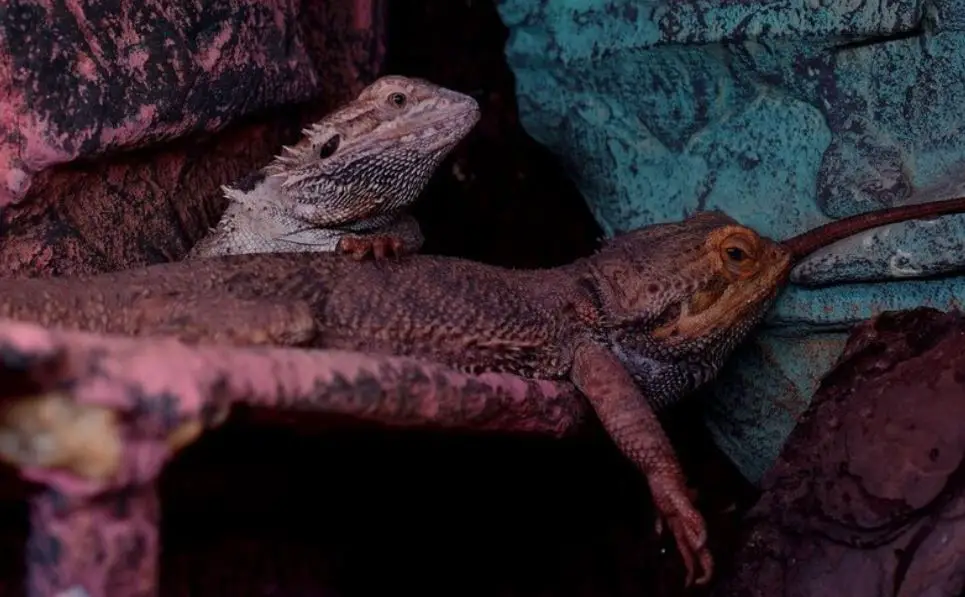

2 Responses
Is he in a coma or is he sick, that’s the question I used to wonder. It turns out that it can be a very common habit but is a lot of confusion. I used to see him tired and trying to find a way to solve this problem. I did the research and realized, you can change this by giving him a break. Be it going out, listening to music or playing some games,…
I have read so many posts concerning the blogger lovers but this article is truly a good article, keep it up.